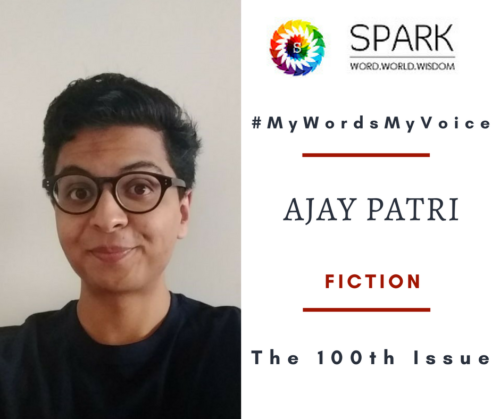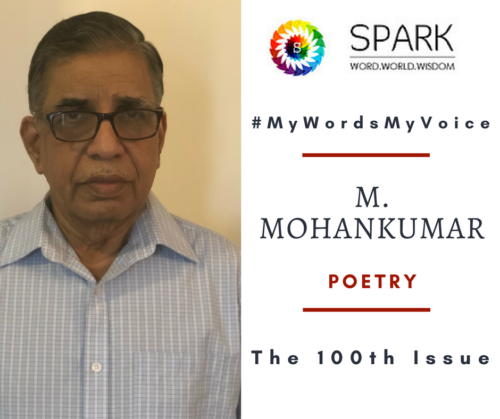by Ajay Patri
What theme are you addressing in your piece? Why is this important to you?
Ajay Patri: I’m fascinated by the trust humans impose in symbolic figures. This trust is often a matter of convenience, to be discarded if the values the idol stands for are no longer the ones that people seek. In the story, I wanted to explore this relationship from the perspective of a once revered idol who finds his relevancy being threatened. I also wanted to touch upon the idea that all individuals possess agency, that no matter how much individuals are swayed by the goals set by somebody else, they have the ability to make their own choices. I believe in the value of such agency and I wanted the story to reflect this.
We were there, you and I. We watched as the ambulance wailed louder and louder, as if the ghastly sound of its siren alone could shift the impasse that lay before it, of people who jostled in the middle of the road and ignored the green of the traffic light that urged them to keep moving. They formed a circle around two men who faced each other like the jousting knights of old, abuses and spittle streaming out of their mouths. The more agitated the men became, the more the crowd got excited, soon baying for some blood to be spilt on the potholed road. We kept our distance from this scene, just like the crowd kept its distance from the ambulance in which an old woman finally breathed her last, tired of waiting for a relief that was not forthcoming.
That was the moment I decided to stop watching and do something. It was not a difficult decision to take. You see, I had always been a man of action. Not for me the long speeches and sermons that my contemporaries resorted to when cajoling a crowd. No, sir. I believed in action, clear and demonstrable action.
So, what was it I did, you wonder? It was simple, really. I walked away. Does this strike you as too simple an act? I agree that it is. But you must know why I chose to act the way I did. You see, in this country of ours, the grandest gestures often mean the least. In order to be meaningful, my action had to be small. This was a trick I learnt a long time ago when I faced the British. Little did I know that I would deploy it against my own countrymen one day.
But wait. You want to know what happened when I walked away. Well, the letters on the signboard that spelt my name faded. My name, in short, no longer graced a road that had witnessed such needless pain.
Your eyes regard me with pity and, if you spoke, you would have told me that my action ended in failure. I know this already. I know that the fight on the road ended with not so much as a scratch on the two men. The crowd dispersed to their cars and scooters, disappointed that things had not taken a more violent turn. None of them noticed what I had done. Life went on as it always had, except for that poor woman in the ambulance.
To be honest, and being honest is second nature to me, being rebuffed did not dampen my spirit. It enervated me. I had always been up for a fight. So, I looked around for other places I could walk away from to show my displeasure to the people of this country.
I decided on the portraits. I know, I know, it wasn’t the boldest move I could have conceived of. But I happen to be a methodical man. Besides, the portraits are not as inconsequential as you would think. You know as well as I do that they adorn the walls of every government office in this country. I have seen you in these places, waiting and watching as men and women plotted and conspired to lead our nation to ruin. It must have pained you to stand there and bear witness to such rampant sloth and corruption. It certainly hurt me. If the whole thing had been a Greek tragedy, my portraits would have wept tears of blood. Now that would have attracted some attention for sure!
Now anyone who noticed the portraits emptying out should have been scared out of their wits. It should have made them question their sanity, made them wonder if they had been transported into a magical world where the inhabitants of portraits are not bound by frames. But you know what happened? Nothing. They carried on as before. It was almost as if the portraits, even when they had my visage printed on them, had become a part of the background, no more to be noticed than a white, featureless wall.
Now I admit that I was a little disheartened. I even contemplated slinking back to the portraits and the roads in the middle of the night like a guilty child coming home after playing truant. But the old strain of stubbornness in me revolted. I couldn’t give up, not when there was a scrap of hope to cling on to.
And who better to engender hope than children? Catch them young, as the pithy saying goes. Every child in this country knows me, after all. I’m the father they’ve never known. Most of them have been forced, at some point in their lives, to dress up as me for a fancy-dress competition. They hate it and I don’t blame them for it. A child would prefer to be dressed as something more impressive than an old man in tattered clothes with a walking stick.
But I digress! I must tell you what I did, even if you were there (and why wouldn’t you be there?). I walked out of the textbooks, those reams and reams of pages that the children are made to memorise. Every name and picture of mine was replaced by a blank spot. At last, I had somebody’s attention! The children were puzzled by what they saw and showed their textbooks to the adults. But alas, I could not have predicted what followed. The adults began bickering in the fashion of those men in the middle of the road, all bark and no bite, a sorry spectacle that nevertheless got everyone excited. Someone said that political forces were trying to rewrite history. Someone else said that children in the country should henceforth be home-schooled. It was pandemonium. The children, whose attention I craved, were the first to lose interest. They gave up explaining to their parents and teachers that I had disappeared from their textbooks overnight. Instead, they sat down and drew pictures of American superheroes and Japanese cartoons in the space I had vacated.
My earlier disappointment turned to despair. Despair for the country we had become. I also felt jilted, you see. I bemoaned my sacrifice, wondering if it was all in vain. And in the depths of my despair, an epiphany struck me. It was this: I was deluded all along. I had been wrong to believe that I still mattered, that the people in this country would notice the things I did. Wrong to think they still looked to me for guidance as they once had. Wrong to think I was more than a symbol.
I see your forehead wrinkling in disgust. You’re wondering when I gave myself up to self-pity. I want to assure you that I don’t speak these words carelessly. I say that I do not matter because a dead person cannot have any expectations from the world of the living. I now inhabit a space different from the one you do. The happiness and grief you experience from one day to another are not for me to partake in. And if I cannot experience these emotions first-hand like you, what right do I have to preach?
The irony of my position is not lost on me. All my life, I cautioned people about the perils of pride and told them to stay humble to preserve their dignity. Now my dignity is dented in my own eyes, where it should matter the most. I thought I was doing the country a service by staging my walkouts. I see now that I was doing it for myself, trying to show that I was too good for this country. On behalf of your fellow citizens, do accept my apology for giving way to hubris like this.
You ask me in your wordless fashion if this is the end of my story, if I told you all this only to apologise. The answer is a simple yes. This is the end of my story. In fact, my story ended a long time ago, on a cold January evening. You, on the other hand, are more timeless, more ubiquitous, than I am. You are more than a common man and you don’t need me to show you the way. I trust you. I trust you because I was once in your shoes, wondering if I had it in me to make a difference to the world I lived in. I found my way eventually, and with that found my purpose in life. You can do this too. And if this results in you walking down a path different from the one I trod on, that is fine. For it is more important to employ your reason and be responsible for your choices than it is to blindly follow a dead man’s ideals. In the end, if this is the only thing we agree about, I will consider our exchange a fruitful one.
I also hope that one day, in the not-so-distant future, you will find your voice, for I know that your lack of speech is not for the lack of a voice. I look forward to the moment you will stop watching and start talking. You will have an eager audience waiting to hear about your life’s journey.







Loved your perspective! Beautiful narration.